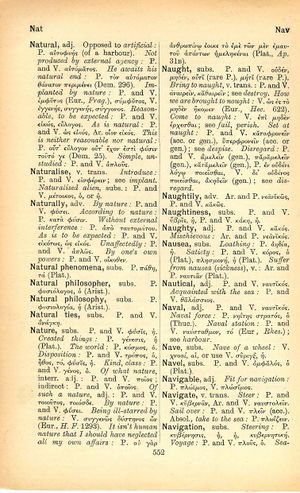nature: Difference between revisions
From LSJ
τὸ ἓν καὶ τὸ ὂν πολλαχῶς λέγεται → the term being and the term one are used in many ways, one and being have various meanings, one and being have many senses
m (Text replacement - "Plat., <b class="b2">A</b>" to "Plat., A") |
mNo edit summary |
||
| Line 1: | Line 1: | ||
{{Woodhouse1 | {{Woodhouse1 | ||
|Text=[[File:woodhouse_552.jpg|thumb|link={{filepath:woodhouse_552.jpg}}]]'''subs.''' | |Text=[[File:woodhouse_552.jpg|thumb|link={{filepath:woodhouse_552.jpg}}]]'''subs.''' | ||
P. and V. [[φύσις]], ἡ. | P. and V. [[φύσις]], ἡ. | ||
[[created things]]: P. [[γένεσις]], ἡ (Plat.). | |||
[[the world]]: P. [[κόσμος]], ὁ. | |||
[[disposition]]: P. and V. [[τρόπος]], ὁ, [[ἦθος]], τό, [[φύσις]], ἡ. | |||
[[kind]], [[class]]: P. and V. [[γένος]], ὁ. | |||
[[of what nature]], interr. adj.: P. and V. [[ποῖος]]; indirect: P. and V. [[ὁποῖος]]. | |||
[[of such a nature]], adj.: P. and V. [[τοιοῦτος]], [[τοιόσδε]]. | |||
[[by nature]]: P. and V. φύσει. | |||
[[being ill-starred by nature]]: V. συγγενῶς [[δύστηνος]] ὤν (Eur., ''H.F.'' 1293). | |||
[[it isn't human nature that I should have neglected all my own affairs]]: P. οὐ γὰρ ἀνθρωπίνῳ ἔοικε τὸ ἐμὲ τῶν μὲν [[ἐμαυτοῦ]] ἁπάντων ἡμεληκέναι (Plat., Ap. 31B). | |||
}} | }} | ||
Revision as of 13:10, 7 October 2019
English > Greek (Woodhouse)
subs.
P. and V. φύσις, ἡ.
created things: P. γένεσις, ἡ (Plat.).
disposition: P. and V. τρόπος, ὁ, ἦθος, τό, φύσις, ἡ.
kind, class: P. and V. γένος, ὁ.
of what nature, interr. adj.: P. and V. ποῖος; indirect: P. and V. ὁποῖος.
of such a nature, adj.: P. and V. τοιοῦτος, τοιόσδε.
by nature: P. and V. φύσει.
being ill-starred by nature: V. συγγενῶς δύστηνος ὤν (Eur., H.F. 1293).
it isn't human nature that I should have neglected all my own affairs: P. οὐ γὰρ ἀνθρωπίνῳ ἔοικε τὸ ἐμὲ τῶν μὲν ἐμαυτοῦ ἁπάντων ἡμεληκέναι (Plat., Ap. 31B).

